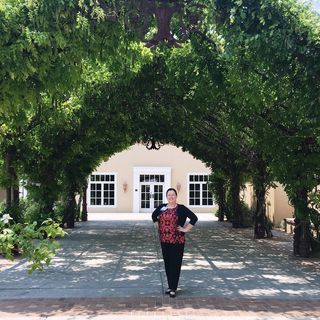Education
Learning About Privilege
Shattering myths of education and embracing growth.
Posted July 21, 2017

By Dr. Kim Case, Ph.D.
When asked to think about how our group membership provides us with certain advantages in life, we often react with shock, guilt, anger, denial, and defensiveness. By virtue of being born into certain groups, we find ourselves receiving unearned rewards. For example, just the absence of discrimination is a daily benefit experienced by men, white people, and heterosexuals. Of course, many of these group identities intersect to result in complex mixtures of both privilege and disadvantage, but here I focus on raising awareness of privilege. As members of privileged groups, the daily advantages fade into the background and remain invisible until we are challenged to reflect on how our group is actually treated much better than oppressed groups that face severe prejudice and discrimination. Therefore, it is essential that we also face our own privilege, open up to learning about how group inequality benefits some while punishing others, and become comfortable with the discomfort of growing as individuals. In the end, this discomfort and growth will (hopefully) lead us to engage in social action to reduce group inequality, all for the greater good.
On December 3, 2014, Channel 2 News in Houston ran a story about a white male student who was “uncomfortable” with an ungraded assignment about white privilege. A professor teaching the first-year students’ course, Learning Frameworks, at Lone Star College-Tomball asked students to reflect on the white privilege checklist, marking which items related to them. Sadly, the news report labeled the assignment as “controversial,” yet included no historical context, educational experts, or critical analysis of student expectations and myths related to learning. Although I reached out to the reporter covering the story, she declined my offer to shed some “privilege” expertise that could educate the public. Let’s shatter a few myths on our own:
Myth 1: White Privilege Checklist = Controversial
Not really. This checklist has been around since Peggy McIntosh published it in 1988. Since then, it has exploded as a teaching tool in high schools, college classrooms, graduate-level courses, conference workshops, and community groups across the country and beyond. We are now decades into teaching and learning what is often called “privilege studies.” Many students perceive privilege content within a course as an attack on the students with the privilege. For example, studying white privilege is viewed as an attack on white students. However, rather than blame individuals, privilege studies critically analyze the full system of oppression with many interlocking parts that include discrimination and privilege. Lucky for the student in the story, he took a course from an educated professor aware enough to include this checklist and offer him and his classmates the opportunity to think, learn, grow, and develop as individuals. This assignment is only viewed as “controversial” because most of the general population and students have not yet encountered the concept. Privilege is usually completely invisible to those that benefit from it. That’s all the more reason to applaud the professor for providing a safe space for students to grow.
Myth 2: Uncomfortable = Bad
Math makes many students uncomfortable, but no one is letting them out of math and statistics required courses to avoid discomfort. The white student in the story implies that course content should never make a student feel uncomfortable. In fact, being uncomfortable is a good sign that some serious advancements in personal growth and learning are about to take place. The key is to stay with the discomfort, explore it, and reflect on what the discomfort can teach you/us. Many teaching scholars have written about the importance of embracing these uncomfortable moments whether you are alone completing the white privilege checklist or in a room full of classmates discussing racism and privilege. This myth implies that learning should be easy and avoid the difficult task of critical thinking. Professors owe students more than easy courses and degrees that never challenged them to think critically about the world and the systems that maintain unfair group disparities.
Myth 3: Teaching about Privilege = Getting Fired
Sadly, many of the public comments posted in response to this story online called for the professor teaching about white privilege to be fired. This type of backlash is quite common when teachers attempt to raise awareness about oppression, discrimination, disparities, and especially privilege. These calls for firing the professor amount to an uninformed witch hunt designed to maintain the status quo and squash attempts to develop critical thinking around the structure of racism at the societal and institutional level. Medical doctors regularly ask us to do things that make us uncomfortable, such as get blood drawn or endure a colonoscopy, but we understand that this is for our own physical health and do not call for them to be fired. In much the same vein, learning about privilege and reflecting on one’s own biases is for the greater health of the mind. Avoiding the facts or firing someone that illuminates those facts only keeps us ignorant and uninformed. Instead, we should express our gratitude to this professor for being willing to bring very difficult discussions to students and offer them the chance to learn about themselves and hopefully better understand others in the safest place for doing so—the college classroom.
Supporting Privilege Studies
I will close with a call to action: Educate yourself. Be open and willing to discover your own biases and invisible privileges. In the matrix of privilege and oppression, most of us experience a mix of privileged and marginalized identities, but we all hold ultimate responsibility for making our own privilege visible. Follow news sources, read blogs and essays, or take courses that challenge you and the very fabric of your current line of thinking. In fact, demand that your news sources and/or coursework require you to truly think, reflect, and grow. Be brave and allow your own exploration and learning to take you to uncomfortable places that just might lead you to an entirely different world that you never knew existed.
Resources
For more on privilege studies, Kim Case’s website includes resources related to teaching and learning about privilege, intersectionality, and inclusive practices as well as information on her diversity and inclusion consulting. She also provides resources via the Intersectional and Privilege Studies page.
Educators can access information on teaching in her two books: Deconstructing Privilege: Teaching and Learning as Allies in the Classroom (2013) and Intersectional Pedagogy: Complicating Identity and Social Justice (2017).
Kim A. Case, Ph.D. is a professor of psychology at the University of Houston-Clear Lake. A social psychologist by training, she applies critical race theory, feminist theory, queer theory, and intersectional theory to her teaching, research, and service to the profession, university, and community. Her mixed-methods research examines ally behavior when encountering bias and interventions to increase understanding of intersectionality and systemic privilege, reduce prejudice, and create inclusive spaces within educational and community settings. Her pedagogical scholarship addresses diversity-course effectiveness, inclusive classroom practices, and teaching for social justice.


